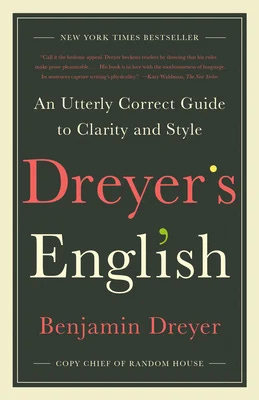Flash Extravaganza Day 19 (For All Subscribers): The Breath of Your Prose
punctuating flash fiction (or not)
Photo by Sven Mieke on Unsplash
“If words are the flesh, muscle, and bone of prose, punctuation is the breath.” ~Benjamin Dreyer, Dryer’s English
Hello! I’m sending this Day 19 post out to all 9,456 of you! Whether you are a free or paying subscriber, your support and enthusiasm for The Art of Flash Fiction means the world to me. I’m honored to have a small part in your writing life, and I hope you enjoy what I have to offer today.
First, a little drumroll…
As of this writing, those of you participating in the Flash Extravaganza have drafted TWO HUNDRED AND ONE brilliant new flashes! Nine more days to go! Keep up the amazing work. I’m so inspired by all of you!
Back when I was planning this Extravaganza, I called for specific requests, wish lists, topics of interest you wanted me to cover over this four weeks. One request was to address “the power of punctuation in flash (dashes, colons, commas, spaces).”
What follows is…not that.
I don’t consider myself a grammarian, and I frequently flout the rules of punctuation in my own work. But I love the quote from Benjamin Dreyer above, where he calls punctuation the “breath” of our prose. That makes sense to me, and it led me to these thoughts:
Flash fiction is very close to poetry
Flash writers should steal from the poet’s toolbox every chance they get
Flash is a form that is akin to music, so…
Flash benefits from musical prose
Punctuation as “breath” has the potential to heighten the musicality of a piece
It also has the potential to mar its musicality, creating discordance, choking the breath, interrupting flow, etc. (but sometimes you want discordance?)
Flash, being a fluid form, lends itself well to innovation and rule bending
Therefore…Playing with punctuation serves the flash writer, who does well to be open and receptive to innovating with it
IT ALWAYS COMES BACK TO EMOTION, MOVEMENT, & RESONANCE
If punctuation is the “breath” of your prose, and how we breathe is closely tied to how we feel, then let your punctuation (or lack, thereof) reflect the emotion you’re attempting to evoke in your reader, the felt experience you want to give them. I’d extend this to sentence length. You’ll want to vary them, mostly, but there are reasons for giving a series of short sentences and reasons for a lot of long sentences. Here are a few things punctuation and sentence length do in any writing:
create or diminish breathlessness
modify the speed of the sentence
show emphasis
a long sentence, with many clauses, and diversions slows the reader down, encourages them to flow along with the images and movement (good for description, tone setting, providing backstory, etc.)
shorter sentences, staccato rhythm keeps the reader moving from image to image, action to action, its jumpiness speeds things up (good for conveying action, heightened stakes, keeping the reader off-guard and compelled)
But what does NO punctuation or minimal punctuation do?
Note: This is slightly controversial, and Benjamin Dreyer and Mssrs. Strunk & White would disagree, but…To me, this approach lends an air of dreaminess or otherworldliness to the prose. Odd or minimal or no punctuation renders a gauzy feel to the story: This may or may not have happened. Or, this happened, but it’s difficult or traumatic or I need to tell it slant. What it needs perhaps is a feeling of lostness. It needs to look and sound weird. It needs to be slightly out of focus. Or there’s a feeling I want to convey via the punctuation that will heighten the feeling I want to convey via the prose, and so forth.
SOME EXAMPLES
My story, “Procession,” in Swamp Pink - I wanted the prose to echo the idea of marching and I think I achieved that.
*****
My story, “Cracks” in - an experimental piece I loved writing for which I got some nice '“press”:
Of “Cracks,” Editor Brian Mihok said: “This kind of piece is so hard to pull off! The building momentum and cumulative effect of it's style is so gripping, not to mention the sonic quality of writing a piece this way. The way the sound of the words move is mesmerizing. It builds tension and energy as it goes and felt as though we go through the phases of someone's life. It felt as a reader that we are in really good hands and can trust where you were taking us.”
The piece was also highlighted on Aarik Danielsen’s terrific blog feature, the “Friday Five” in which he had this to say: "This Kathy Fish piece bears remarkable weight and motion, never sacrificing one for the other, as it inhabits the emotional rhythms of maintaining or repairing anything, be it a home or a heart."
And it was also recommended as a favorite essay of 2024 by Robert Erle Barham in Current. I hadn’t written it as an essay, but I can very much see how it could be read as one.
*****
Not flash fiction, but Susan Steinberg’s stories in her brilliant collection, Spectacle contain a few examples of “creative punctuation.”
This, from a 2013 review by David Maine in Pop Matters, “Twelve Hard Slaps to the Face”:
“Some stories take these stylistic strategies to an extreme, eschewing all paragraph breaks and punctuation apart from semicolons, utilizing the rhythms of the sentences to convey emotional impact. In this way, the stories resemble poems or even songs as much as anything else. “Underfed”, “Cowgirl” and “Spectator” each consist of a single unresolved sentence, a series of independent and dependent clauses strung together with semicolons. Over time, their repetitious phrasings begin to act as punctuation themselves, as periods or commas that allow the reader to pause in between the absorption of finely-nuanced packets of information:
“…it was never just, I need you; it was never just, Let’s have a good time; it was the doctor saying, I need you to pull the plug; it was never that; it was softer than that; it was more like, I need you to do the right thing; it was more like, Your father would want it this way; it was me not knowing what he would want; it was no one knowing what anyone else would ever want;… it was the doctor saying, This isn’t funny; it was the doctor saying, This isn’t life; it was the doctor saying, Trust me; it was hard to trust a person I couldn’t see; it was hard to trust a person I could;…”
And somewhere friends, in the literary universe, there exists a flash fiction that used dollar signs for punctuation. I don’t think I dreamt this. I don’t remember the title or the name of the author or where it was published, but I think it was reprinted in a “best of” anthology. I will happily send a crisp ten-dollar bill to anyone who can hunt this story down for me. (I’m serious.)
ALL of the above is just to say, weird or no punctuation can work.
Of course all writers should know the rules of grammar and punctuation. These are our tools. You’d not trust a surgeon who doesn’t know how to use a scalpel, would you? Or a chef who doesn’t know the difference between a whisk and a spatula?
RECOMMENDED READING
So yes, most of the time you will want the breath of your prose to follow the basic rules of punctuation. Those rules are there for a good reason! To that end, I highly recommend the aforementioned and excellent Dreyer’s English.
And the classic you probably own and have read: Strunk & White’s The Elements of Style.
YOUR PROMPT
Today, I want you to take a stab at “creative punctuation.”
If you got all A’s in Grammar as a kid this prompt may give you hives.
Lean in to the discomfort and allow whatever flows from your pen or keyboard.
Try one or the other:
punctuate a piece with dollar signs or some other symbols on your keyboard
use no punctuation at all
This works best if the piece is very short. The “meaning” of the punctuation may not be clear until you’re finished writing. Sometimes when we go in to experiment, the process drives the story! Really let go and play with this today and see what happens. You might end up with a poem. Or a flash that looks like a poem. Be a little daring today. Consider this LOW STAKES writing, but often low stakes writing produces the best work.
And give your piece a great title!
Have fun!
Kathy











STOP
Some parents want their kids to STOP talking STOP leaving their toys on the floor STOP fighting STOP waking up so early on weekends STOP chewing with their mouth open STOP talking back STOP poking their brother in the car STOP asking are we there yet STOP forgetting to brush their teeth or do their homework or take the trash out STOP growing up so fast STOP STOP STOP forgetting that this is our sign to STOP wishing away their childhoods and START pleading that you will someday take your last breath knowing that their lungs are still taking in air and that their heart continues beating long after yours has STOPPED
Mine is more a poem than a story, I think, but it’s what it wanted to be. And it was fun. I love your 2 stories, Kathy. Not to be negative but I have to say stories without any punctuation or some kind of visual pause (like in “Cracks”) is really hard on my eyes & a challenge to read. Anyway…..here’s my whatever-it-is which I cobbled together with words & phrases from a file I keep.
Identity
There’s no other way to say this except >>>she was a tatterdemalion >>>over-caffeinated and full of spit>>>a wet melon in a tornado>>>a swelling purple bruise>>>the tart scent of a striking match>>>a glorious larval white monster>>>
{but also}
>>>a sea-colored sky>>>the exhilaration of flying horses>>>cool twilight in a mountain pass>>>a blown kiss landing on a cheek>>>the secret pleasure of a good deed untold>>>a juicy fruit pie>>>
{because experience has taught her}
>>>Our hearts are so much bigger than our broken parts>>>Our souls are so much stronger than our shredded parts<<<